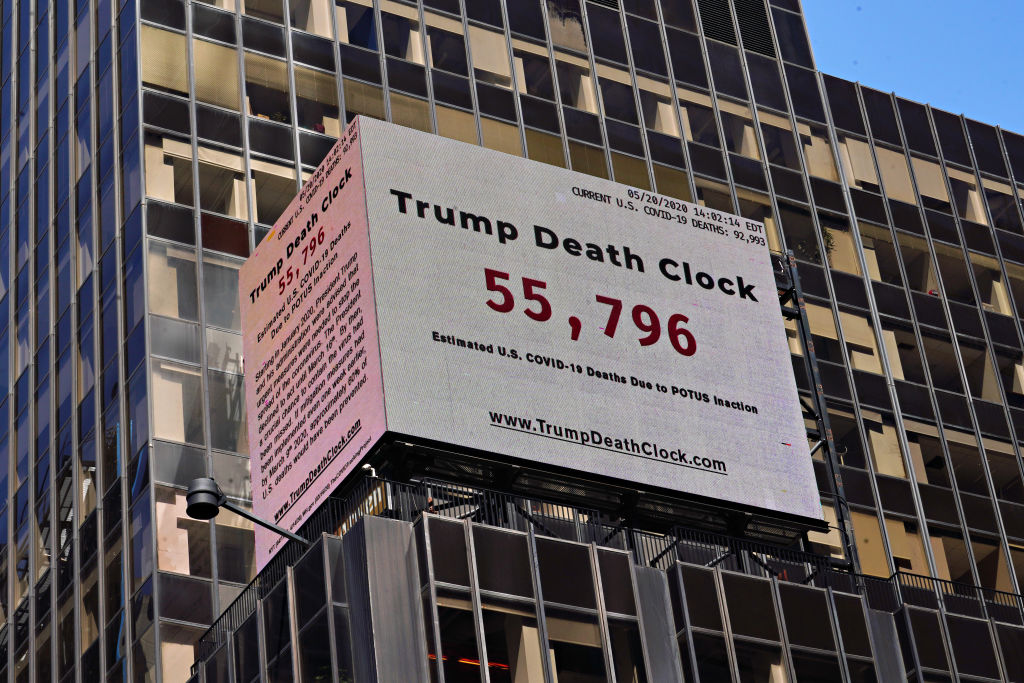Has Trump successfully politicized the pandemic?


A free daily email with the biggest news stories of the day – and the best features from TheWeek.com
You are now subscribed
Your newsletter sign-up was successful
A new poll from Politico and Harvard's School of Public Health found that Americans are broadly concerned about the COVID-19 pandemic — 78 percent of respondents called their state's outbreak a "serious problem," including 88 percent of Democrats, 63 percent of Republicans, and 77 percent of independents. But there is a sharp new partisan divide about how to respond.
When asked if nonessential businesses — like hair salons, gyms, malls — should be allowed to reopen in their state, 51 percent said no, not until the spread of COVID-19 has been contained, while 46 percent said yes. But 61 percent of Republicans favored opening all businesses now, as President Trump has been forcefully pushing, while 69 percent of Democrats backed keeping nonessential businesses closed, a position most public health experts prefer.
"What we have here is a very real partisan split that you don't expect to find in a public health epidemic," Robert Blendon, the Harvard health policy professor who helped design the poll, tells Politico. "I think the president and many Republican leaders in the Congress have really defined getting the economy going as a critical issue, where Democrats don't buy into that focus." The poll was conducted May 5-10 among 1,007 adults and has a margin of error of ±3.5 percentage points.
The Week
Escape your echo chamber. Get the facts behind the news, plus analysis from multiple perspectives.

Sign up for The Week's Free Newsletters
From our morning news briefing to a weekly Good News Newsletter, get the best of The Week delivered directly to your inbox.
From our morning news briefing to a weekly Good News Newsletter, get the best of The Week delivered directly to your inbox.
Trump has been trying to get Americans to subscribe to the idea of transitioning to a feeling of normalcy, and he has succeeded in one way, John Harris argues at Politico: "The incumbent president has managed to make American politics the first arena of national life to return to something recognizable as normal." Harris explains:
Campuses are still closed, and may yet be for months to come. Most people still don't feel it's safe to visit aging relatives. ... But political culture has returned to something close to its pre-pandemic state. People are filled with resentment and malice toward their fellow citizens. They are arguing over eccentric or ephemeral controversies. They are sanctimoniously and often hypocritically denouncing the sanctimoniousness and hypocrisy of their opponents. Above all, many influential voices across the ideological spectrum are united in the assumption that the most important subject — constant and all-consuming — to be thinking and talking about is Trump. [John Harris, Politico]
Trump is "trying to get American politics back to normal, as he understands the word," Harris writes. "At least in some narrow ways he knows it's working." Read his column at Politico.
A free daily email with the biggest news stories of the day – and the best features from TheWeek.com
Peter has worked as a news and culture writer and editor at The Week since the site's launch in 2008. He covers politics, world affairs, religion and cultural currents. His journalism career began as a copy editor at a financial newswire and has included editorial positions at The New York Times Magazine, Facts on File, and Oregon State University.
-
 Political cartoons for February 16
Political cartoons for February 16Cartoons Monday’s political cartoons include President's Day, a valentine from the Epstein files, and more
-
 Regent Hong Kong: a tranquil haven with a prime waterfront spot
Regent Hong Kong: a tranquil haven with a prime waterfront spotThe Week Recommends The trendy hotel recently underwent an extensive two-year revamp
-
 The problem with diagnosing profound autism
The problem with diagnosing profound autismThe Explainer Experts are reconsidering the idea of autism as a spectrum, which could impact diagnoses and policy making for the condition
-
 Judge blocks Hegseth from punishing Kelly over video
Judge blocks Hegseth from punishing Kelly over videoSpeed Read Defense Secretary Pete Hegseth pushed for the senator to be demoted over a video in which he reminds military officials they should refuse illegal orders
-
 Trump’s EPA kills legal basis for federal climate policy
Trump’s EPA kills legal basis for federal climate policySpeed Read The government’s authority to regulate several planet-warming pollutants has been repealed
-
 House votes to end Trump’s Canada tariffs
House votes to end Trump’s Canada tariffsSpeed Read Six Republicans joined with Democrats to repeal the president’s tariffs
-
 Bondi, Democrats clash over Epstein in hearing
Bondi, Democrats clash over Epstein in hearingSpeed Read Attorney General Pam Bondi ignored survivors of convicted sex offender Jeffrey Epstein and demanded that Democrats apologize to Trump
-
 El Paso airspace closure tied to FAA-Pentagon standoff
El Paso airspace closure tied to FAA-Pentagon standoffSpeed Read The closure in the Texas border city stemmed from disagreements between the Federal Aviation Administration and Pentagon officials over drone-related tests
-
 Judge blocks Trump suit for Michigan voter rolls
Judge blocks Trump suit for Michigan voter rollsSpeed Read A Trump-appointed federal judge rejected the administration’s demand for voters’ personal data
-
 US to send 200 troops to Nigeria to train army
US to send 200 troops to Nigeria to train armySpeed Read Trump has accused the West African government of failing to protect Christians from terrorist attacks
-
 Grand jury rejects charging 6 Democrats for ‘orders’ video
Grand jury rejects charging 6 Democrats for ‘orders’ videoSpeed Read The jury refused to indict Democratic lawmakers for a video in which they urged military members to resist illegal orders
